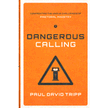Counselors Reflect on Dangerous Calling by Paul Tripp
A Series to Care for the Care Takers of God’s People
“Because sin blinds, God has set up the body of Christ to function as an instrument of seeing in our lives, so that we can know ourselves with a depth and accuracy that would be impossible if left on our own.” p. 34-35.
In our insecurities we can often mistake help from others as an insult to our value and personhood. “How dare they,” we might ask ourselves privately when someone suggests that perhaps they can help us or points out an inconsistency. How many times have you bristled when sitting at a traffic light and the person behind you beeps his horn lightly to nudge you through the light that just turned green? Exasperation and hurt feelings erupt more than a sense of gratitude for their help. Pride seems so natural to us. It seems to be our “go to” response and sadly, even Christians are still prone to an overinflated sense of self (or the opposite. Both are dangerous). But never in the history of the world has pride worked out good for us. Never. In fact, it consistently works against us in ways that are sometimes subtle, but often in ways that are obvious. Yet, the pride itself can render us incapable of seeing that.
Pride carries a putrid and destructive devastation that creates a wedge between us and other people, and with God. It prevents authenticity (first carelessly given away in the Garden of Eden when the first couple began to cover up). It removes the “shalom” of safety that provides a restfulness which God intends for us. Jesus said, “The thief comes only to steal and kill and destroy, but I came that they might have life and have it abundantly.” Pride, born of the father of lies, is our enemy and cares only that we might be destitute and hopeless. It isolates us and separates us from the rest of the body. This becomes a devastating roadblock before the pastor or Christian worker. Proverbs 16:18 gives fair warning that destruction may soon follow.
Pride is wound up in itself and for multiple reasons the most miserable people on the earth seem to be those who are dedicated to themselves. Those who engage in and ensconce themselves in myopic thinking find that it is impossible to see outside of their own frame of minds. But very few people start here. This thinking rarely starts overnight and can sometimes end stubbornly. How do we get caught up in this? C.S. Lewis said,
“A proud man is always looking down on things and people; and, of course, as long as you are looking down, you cannot see something that is above you.”
This has been the beginning of the end for many pastors and Christian workers who have dwelt too long upon themself. As Lewis notes, it keeps us from looking upward, but also damages the ability to look outward. And it certainly removes a person from being teachable. It resists honesty. It kills.
God has mercifully provided the body of Christ to provide life-giving and reflective help. We deeply need each other. In my life it has been those who I have surrounded myself with that have often spoken painful truths to me, but it has driven me into the arms of the Savior and into deeper relationship with those who have loved me enough to be honest.
Winston Churchill pointed out that criticism may not be agreeable, but it’s necessary. It fulfills the same function as pain in the human body. It calls attention to an unhealthy state of things.
But God says amazing things to us about pride and they are words that bring incredible hope and healing. At the end of his warning about the ugly results of pride James writes,
“Humble yourselves before the Lord, and he will exalt you.”
This is remarkable news for us and actually adds life to our relationships and our roles as pastors or Christian workers. It allows the body of Christ to function for the glory of Christ, the good of the body, and for the health of our own lives.
Next week we’ll begin to look at the third sign of a pastor or Christian worker in trouble. Please join us.
 |
Dangerous Calling: Confronting the Unique Challenges of Pastoral Ministry By Paul David Tripp / Crossway Books & Bibles |
